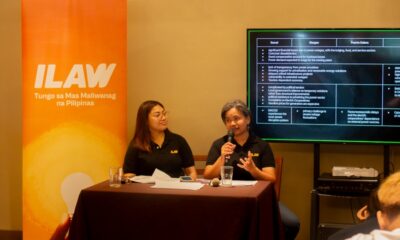News
House Panels Approve Anti-Terror Bill
Two committees at the House of Representatives on Friday approved a measure providing more teeth to the law against terrorism and effectively repealing the Human Security Act of 2007.
The House Committee on Public Order and Safety and Committee on National Defense and Security, chaired by Masbate Rep. Narciso Bravo Jr. and Iloilo Rep. Raul Tupas, respectively, approved the still-unnumbered substitute bill, which seeks to prevent, prohibit, and penalize terrorism.
Bravo said the House bill is similar to the Senate version that was approved in February to fast-track its passage and avoid convening a bicameral conference.
“We have to approve today a bill that is similar to the Senate bill to avoid the necessity to convene a bicameral conference committee,” he said.
The proposed Anti-Terrorism Act of 2020 would provide a strong legal backbone to support the country’s criminal justice response to terrorism, provide the law enforcers the much-needed tools to protect the people from the threat of terrorism and, at the same time, safeguard the rights of those accused of the crime.
The Senate version introduced provisions imposing life imprisonment without parole on those who will propose, incite, conspire, and participate in the planning, training, preparation, and facilitation of a terrorist act; as well as those who will provide material support to terrorists, and recruit anyone to be a member of a terrorist organization.
Under the bill, any person who shall threaten to commit terrorism shall suffer the penalty of 12 years. The same jail term will be meted against those who will propose any terroristic acts or incite others to commit terrorism.
Any person who shall voluntarily and knowingly join any organization, association, or group of persons knowing that such is a terrorist organization, shall suffer imprisonment of 12 years. The same penalty shall be imposed on any person found liable as an accessory in the commission of terrorism.
The measure not only establishes Philippine jurisdiction over Filipinos who may join and fight with terrorist organizations outside the Philippines but also ensures that foreign terrorists do not use the country as a transit point, a safe haven to plan and train new recruits for terrorist attacks in other countries.
The bill also removed the provision on payment of PHP500,000 damages per day of detention of any person acquitted of terrorism charges. But the number of days a suspected person can be detained without a warrant of arrest is 14 calendar days, extendible by 10 days.
A new provision, designating certain Regional Trial Courts (RTCs) as Anti-Terror Courts, was also introduced to ensure the speedy disposition of cases.
The use of videoconferencing for the accused and witnesses to remotely appear and testify will also be allowed under the measure.
The amendments also provide for the police or the military to conduct 60-day surveillance on suspected terrorists, which may be lengthened to another non-extendable period of 30 days, provided that they secure a judicial authorization from the Court of Appeals (CA).
To allay concerns of possible excesses by the authorities, the Commission on Human Rights (CHR) shall be notified in case of detention of a suspected terrorist. (PNA)
































